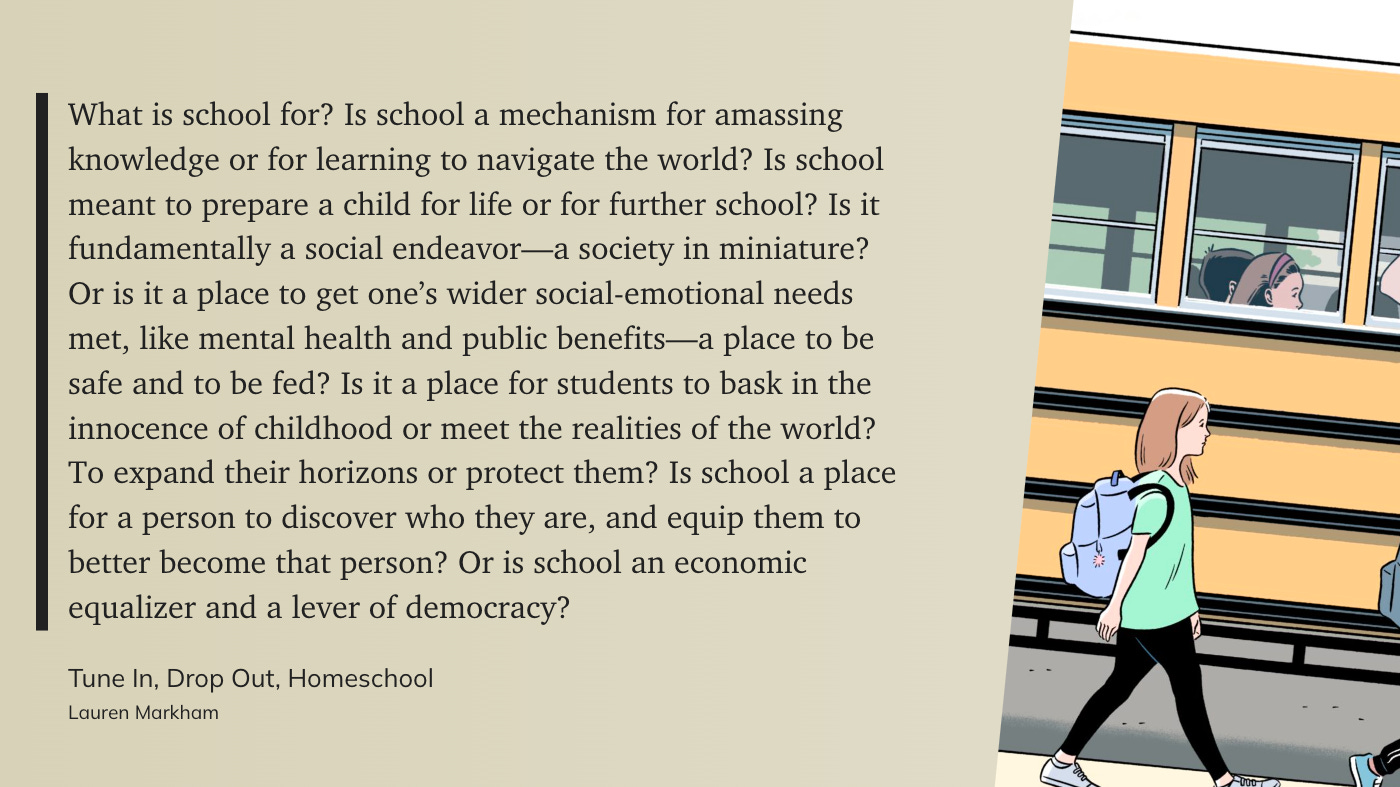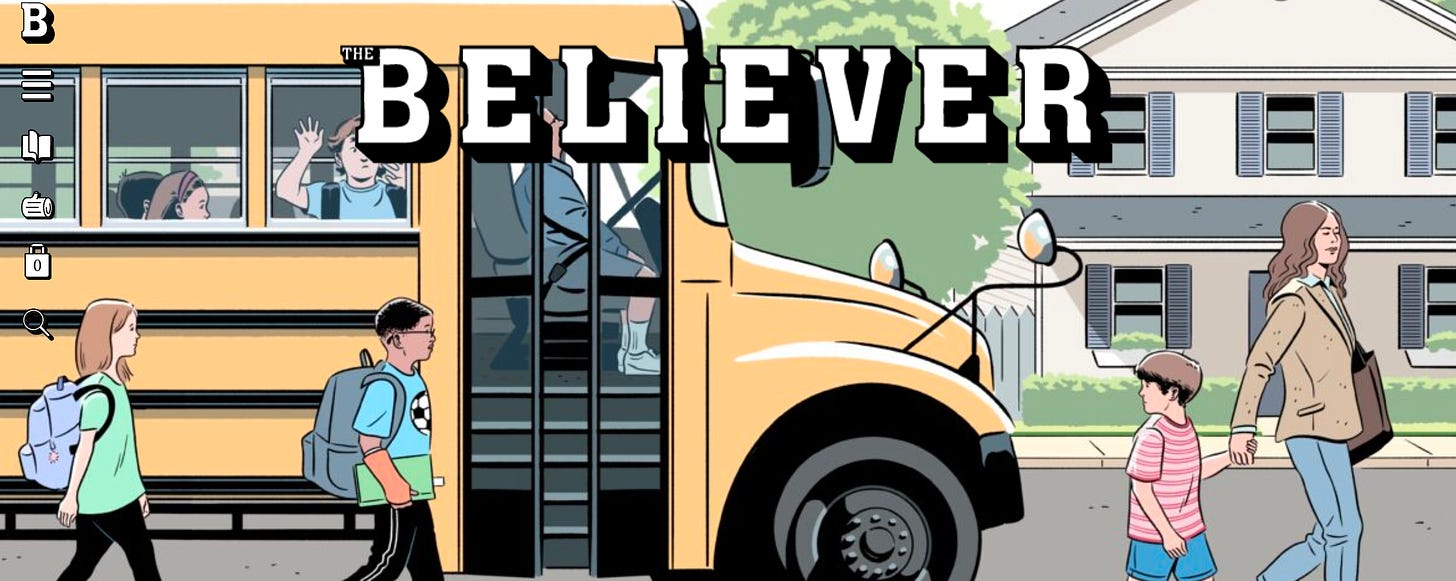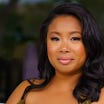#419: The Rise of Homeschooling
Plus: Listen to Melinda and me introduce “The Fog,“ November’s article of the month
Welcome, new subscribers, and welcome back, loyal readers! I’m happy you’re here.
This week, let’s read and talk about homeschooling. I’ve been in education for 25-plus years, so I’ve seen trends come and go. But homeschooling is definitely here to stay, whether we like it or not. (I don’t think I like it, but I’ll keep my views out of this.)
In typical Article Club fashion, I’ve chosen pieces that explore the topic of homeschooling from several vantage points. Here they are:
What does homeschooling tell us about what school is really for?
Interested? Read this week’s lead article, “Tune In, Drop Out, Homeschool.”How big of a deal is the recent trend of homeschooling?
Interested? Read “The Rise of Homeschooling.”Why are so many Black families opting for homeschooling?
Interested? Read “Resisting White-Washed History In Schools.”Why are so many white liberal families also choosing homeschooling?
Interested? Read “Why Liberal Parents Are Opting for Homeschooling“
I hope that this week’s articles resonate with you. If they do, I encourage you to share your thoughts and feelings in the comments. Don’t worry: We don’t need to have a hot debate about the pros and cons of homeschooling. Remember the point of Article Club is to learn, take on ideas, connect, and expand our empathy.
⭐️ Join us for this month’s discussion of ““The Fog: Living in Adoption’s Emotional Aftermath,” Sunday, December 3. We’ll meet from 2:00 to 3:30 pm on Zoom. It’d be great to have you.
Originally published in The New Yorker in April, the piece profiles three adoptees who have come out of “the fog,” or the denial of the trauma of being adopted. Not all adoptees have mixed or negative emotions, but many do.
It’s a deep, important piece, especially if you’re an adoptee or an adoptive parent. I also recommend this article if you’re unfamiliar with issues relating to adoption and if you’re interested in building your empathy.
On the fence? Listen to fellow Article Clubber Melinda and I chat about the piece in this podcast episode. Don’t worry, there aren’t major spoilers, plus Melinda is great. Besides, listening might spur you to sign up for the discussion.
All right, have we convinced you? If so, it’s time to sign up! I’m looking forward to seeing you there. (Also, feel free to ask me questions about how it works.)
1️⃣ Tune In, Drop Out, Homeschool
You simply can’t go wrong reading an article by Lauren Markham. She’s one of my favorite Article Club writers of all time. Her writing is funny and incisive. She understands education through and through. She’s able to capture people’s silliness and seriousness at the same time. And always, she asks the big questions — like, What is school really for? — as she does in this brilliant piece.
Why is homeschooling booming right now? Let me count the ways, she writes:
Because, like Pauline, they are guided by Christ and want to integrate the gospel into their lessons. Because, like Trisha believes, children shouldn’t be at desks all day, and they learn best when their interests guide the curriculum rather than the other way around. Because schools are racist. Because schools require vaccinations. Because they are afraid their children will get COVID. Because schools are increasingly banning books. Because schools are teaching books that parents find inappropriate or offensive. Because of school shootings. Because schools teach stuff that is wildly irrelevant for the future in a world that is vastly remaking itself before our eyes. Because schools are failing, as evidenced by crap test scores and national teacher shortages. Because schools aren’t challenging students enough. Because of bullying. Because schools have a “trans agenda.” Because schools are pawns of the educational-industrial complex. Because schools are pawns of the woke agenda. Because schools are hostile to trans children. Because schools don’t serve neurodiverse children well. Because of the school-to-prison pipeline. Because school is about more than memorization. Because childhood is something to be honored and preserved. Because there’s only a short period of time to spend with our children, and why send them away all day? Because, because, because.
I hope you read this article. And if you do, I’d love to hear what you think. Feel free to leave a comment or email me directly.
By Lauren Markham • The Believer • 37 min
2️⃣ The Rise of Homeschooling
Do you ever find yourself in a conversation about an important topic and nobody seems to know any of the basic facts? I don’t know about you, but I’m not a big fan of this dynamic. That’s why I’m including this informative explainer about homeschooling, which clearly makes the case that homeschooling’s rise is robust even after the pandemic. For example: Since the 2017-18 school year, homeschooling is up 78 percent in California and 103 percent in New York. Florida leads the charge, of course, but I was surprised: Homeschooling is everywhere. Want to know how things are looking in your own school district? Check out the article’s interactive feature and find out.
By Peter Jamison and team • The Washington Post • 10 mins

3️⃣ Resisting White-Washed History In Schools
Once seen as the domain of white, conservative families, homeschooling has become a more popular option for Black parents and their children. They’re fed up with white teachers not believing in their kids. They’re tired of schools that don’t have basic resources. They’re frustrated about the whitewashing of their history classes. More and more Black parents are saying, “Enough is enough.”
Journalist Katie Reilly writes:
For Shari Rohan, it was a social-studies lesson that described enslaved people receiving “on-the-job training.” For Zanetta Lamar, it was the fact that her son was the only Black student in his grade. For Andrea Thomas, it was realizing just how little she had learned about Black history while attending both public and private schools. “I did not want my children to have that same experience.”
By Katie Reilly • Time Magazine • 13 mins
4️⃣ Why Liberal Parents Are Opting for Homeschooling
They never thought they’d take their kids out of school. That’s for white conservative evangelical anti-vaxxers, they assumed. But then Florida passed the Parental Rights in Education Act, often described as the “Don’t Say Gay” bill. Then they found out their kids’ teachers could no longer teach about slavery, or else their children would feel uncomfortable. The final straw was learning that their trans son could not longer use the boys’ bathroom. For these liberal white parents, they know that homeschooling is seen as giving up or selling out — so much so, they don’t want to tell their friends, out of shame. But they just can’t stomach school anymore.
By Charley Locke • Businessweek • 11 mins
Thank you for reading this week’s issue. Hope you liked it. 😀
To our 7 new subscribers — Steven, Fatemeh, and Ana — I hope you find the newsletter a solid addition to your email inbox. To our long-time subscribers (James! Jim! Jimmy!), you’re pretty great, too. Loyal reader Marla, thank you for sharing the newsletter and getting the word out.
If you like Article Club, please help it grow. I really appreciate your support. Here are two ways you can help out:
❤️ Become a paid subscriber, like Betty (thank you). If you’ve subscribed for free for a long time, and you appreciate the articles and author interviews, or if you’ve joined one or more discussions, I encourage you to take the leap. You’ll join an esteemed group of readers who value the mission of Article Club. Plus you’ll receive surprise perks and prizes. It’s $5 a month or $36 a year.
📬 Invite your friends to subscribe. Know someone who’s kind, thoughtful, and loves to read? I’d love it if you encouraged them to subscribe. Word of mouth is by far the best way to strengthen our reading community. Thank you for spreading the word.
On the other hand, if you no longer want to receive this newsletter, please feel free to unsubscribe. See you next Thursday at 9:10 am PT.










Hello everyone! This is my first time commenting. It appears I am the first homeschooler to enter this discussion (I don’t think any of the authors of the articles were homeschoolers themselves).
While I share the fears mentioned in the articles and the thread about the multiple threats our democracy is facing, I do have a different perspective about how homeschooling often works; also, in some ways, I feel our fears are misplaced. I hate seeing those who are leaving oppressive situations and finding joy, learning, and community blamed for bigger, society-wide problems.
Regarding the fear that the rise of homeschooling puts us at risk of becoming a society of people who don’t know basic skills or how to communicate: there is now plenty of data to show that in fact, homeschoolers across demographic backgrounds do well on standardized tests and in college. While we do have society-wide challenges with making sure all kids are literate, critical thinkers, there is no indication that homeschooling makes this problem worse; if anything, the above-mentioned data suggests that it eases the problem.
As for the weight of childrearing and education-support falling on mothers, this, too, is a society-wide problem that mothers inside and out of school struggle mightily with. I’ve recently had a friend leave her job because her child was getting sent home early from Kindergarten most days for reasons of neurodiversity that the school has no plan to support. Another took a leave when her child experienced violence from another student. Many mothers I know find it a job in itself to support their children in school and find some relief in the relative lack of conflict of life outside of school.
Lauren Markham’s wonderful exploration of the world of unschooling (in Tune In, Drop Out, Homeschool) ends with her suggestion that we can support public schools while learning from the ways that homeschooling often better serves children than mass schooling. I share this thinking and will return to her point. Markham herself fears that “If I spent the majority of my time concocting the best, most individualized experience for my white kid, I would, at the end, be fomenting and perpetuating inequality.” This fear does not correspond with the community-oriented lifestyle we experience in the homeschool world. I feared the same thing myself, as a parent of two white boys. But it turns out my energy does not have to go to concocting an education, because, as most homeschoolers will tell you, kids take over their own learning pretty quickly and most homeschoolers become less and less “schooly” over time. We free up many hours that way to invest in after-school activities, and in neighborhood or social justice or community groups that are sadly empty of school-aged families whose time is very full with homework (a practice whose efficacy is not borne out by studies) and fundraisers and grumpiness and schedules that may not fit well with the parent’s jobs and the children’s biorhythms. We can’t do it all; meanwhile, the medical, judicial, and agricultural systems, and/or any of the systems we are enmeshed in, need our intergenerational attention as much as schools do. (And while we’re at it, let’s touch on the fact that what we currently imagine as the heart of democracy is still far from embodying that ideal. School kids undergo a many-year experience with hierarchy that supports neither a desire nor a skill set for participatory democracy).
So let’s remember Markham’s discovery that homeschoolers have a lot to teach our culture about joyful, effective methods of teaching and learning. We need to restrain ourselves from blaming those who opt out of school for what we can acknowledge are widespread problems: lack of support systems for mothers and families, and a broad dissatisfaction with mass schooling that is shared across the political spectrum.
There are excellent systemic solutions that could bring many homeschoolers back into the school mix and improve things for everyone else while we’re at it. I’m in favor of a community college model for K-12 schools, in which you have the option to be on a “degree track,” or to instead sign up for classes offered a la carte, such as foreign language or PE or the school play. Or how about a course on participatory democracy? I’d have sent my kids to these programs in a hot minute if it did not mean sacrificing the self-directed learning and community life they were carrying forward in the majority of their time.
We homeschoolers don’t feel like we’re giving up. Many of us feel thrilled to find multigenerational lives of flexibility and meaning outside of the school system. Like many who are out of school because they are grown, we are at volunteer work, community college classes, or various jobs; many of us are rarely at home, at all.
(And a big thank you to Mark for all the sharing you do with us!).
https://www.act.org/content/dam/act/unsecured/documents/Info-Brief-2015-2.pdf
https://files.eric.ed.gov/fulltext/EJ1005657.pdf
https://berkshirecountryday.org/how-childrens-racial-attitudes-are-shaped/
This topic is fraught in every direction. I had read about the surge in homeschooling, and I understand ALL the reasons why parents might want to have their children homeschooled: starting, of course, with school shootings and the violence of bullying. My biracial children were made so unbelievably miserable in Catholic schools that in high school it became obvious even to the white students, who soon rioted and had one school shut down for good. My older child always told me she learned best in a group, where ideas could be exchanged and, being intellectually gifted, she could help others learn at the same time. Yet she was so burned by her school experience, she grew into her career by teaching herself, online. Teachers bypassed my younger daughter because they thought she was dull when she was simply bored.
Vouchers are squeezing more and more funds from public schools thanks to Trump’s education secretary Betsy Davos, but really, since public education is tied to local taxes, the poor have always been given the shortest end of the stick. I applaud Black parents who want their kids to know our actual history. I believe completely the parents of non-binary students or those who don’t fit the standard mold for whatever reason--the one size fits all approach of education just DOESN’T fit all. But I am deeply concerned that this trend in homeschooling falls most heavily on mothers, especially those with careers--and let’s not pretend being a homemaker isn’t in itself a very difficult job. And there are aspects of social learning students absolutely cannot experience solely in the insular home environment.
What’s more, if this trend grows to overwhelm education in public schools, in future I expect we will see we’ve built a Tower of Babel with homeschooling in the USA; today’s children will be essentially unable to communicate with each other as adults in a world that will require globally advanced technologies and cooperation such as we have never yet known. Today’s students must have a solid foundation to share with students from around the world--in my opinion, they will not, cannot, achieve that by being taught at home. I not only agree with Horace Mann that public education is the pillar on which democracy depends for survival--in fact, I think Earth’s survival itself may depend on it.
I wish we would adopt the indigenous idea that every decision must be considered for its effect on the next seven generations.